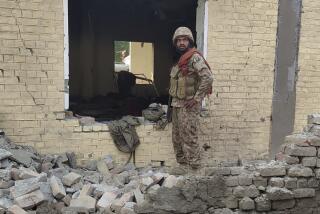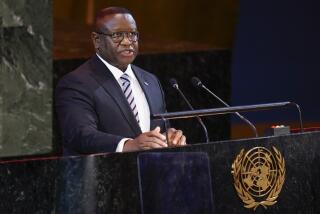Attacks Frustrate Hard-Hit Police
- Share via
YOUSIFIYA, Iraq — The police chief sat alone at his desk Saturday amid the rubble that was once his stationhouse.
“Do these acts serve the interests of the Iraqi people?” he asked, looking up as he doodled disconsolately. “We are already tired and exhausted, but still we want to live.”
He could have been speaking for a whole nation fatigued by violence and destruction, but his little piece of Iraq has seen more than enough for his taste.
On Friday, as many as 50 masked gunmen arrived in half a dozen vehicles and took over the police station in this rural community about 10 miles southwest of Baghdad, Iraqi and U.S. authorities said. The assailants fired several rocket-propelled grenades at the station, ordered everyone out, then placed a number of homemade bombs inside and blew the place up, the chief said. Then they drove off.
Surprisingly, no one was killed or seriously injured.
The midday strike -- just after Friday prayers, as many residents rested or ate lunch -- was nonetheless among the most brazen in recent weeks in a nation where attacks take myriad forms. The assailants appeared to have full confidence that they would not be discovered. Their accents betrayed them as Iraqis, possibly local men, said the chief, who, like others interviewed Saturday, refused to be identified out of fear of retribution.
The assault was also the latest example of what appears to have become the insurgents’ latest tactic -- storming police stations, often the most evident symbol of the new government’s tenuous authority.
For months, police stations have been the target of car bombs and drive-by shootings that have claimed scores of lives. Recent weeks have seen half a dozen takeovers or attempted takeovers of police stations throughout central and south-central Iraq. Some have been occupied for days or weeks; others, like this one, were destroyed.
A week ago, two carloads of gunmen -- some dressed as police officers -- took over a police station in the town of Musayyib, 30 miles south of here. A number of officers were shot dead on the spot before the attackers brought in explosives and blew up the station. Eleven people were killed, including civilians.
Yousifiya is among a number of restive towns south of Baghdad that have become notorious for attacks on Westerners, U.S. forces and the Iraqi police.
On April 29, eight U.S. soldiers were killed here when a car bomb detonated alongside an Army convoy. The police chiefs of the neighboring towns of Mahmoudiya and Latifiya have been assassinated, as have various civilians deemed collaborators with U.S. forces.
U.S. officials have blamed most of the attacks on Sunni Muslim extremists led by elements of Saddam Hussein’s former secret police.
“I would love to have a chance to see them face to face,” the chief said of the attackers. “I would tell them, ‘Give me a salary to be able to bring food to my children, and live a decent life. Then I will willingly leave the police service.’ ”
The chief said he would ask them: “Why don’t you go and directly attack the Americans themselves instead of targeting your countrymen?”
He was away from his post during the bombing, at a meeting in Baghdad. “Even on Fridays we have meetings,” he said, sighing, although the session may have saved his life because an officer of his rank could have been targeted for execution.
“I would love that security prevailed in Iraq, under conditions of freedom and democracy,” the chief said. “Not the democracy of weapons and killings, but rather the democracy and freedom of thoughts and of constructive dialogue. Not of explosions.”
*
Special correspondent Ahmed reported from Yousifiya and Times staff writer McDonnell from Baghdad.
More to Read
Sign up for Essential California
The most important California stories and recommendations in your inbox every morning.
You may occasionally receive promotional content from the Los Angeles Times.













